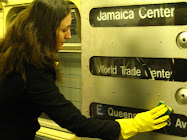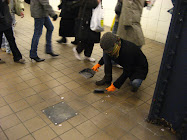Yesterday I visited my future home and found it in a state of disarray. Without going into too much detail, it was dirty and in dire need of a Meaning Cleaning.
So I swept and vacuumed the floors, which came alive under my feet.
It was a quite realization that I can't clean everywhere else if my own house is full of dust.
Friday, May 30, 2008
Friday, May 16, 2008
Cleaning her mountains one bottle at a time
Story Highlights
Teacher in Argentina started youth group to help clean up the environment
About 150 people take part, including about 80 children
On an average Saturday, they often collect about 60 bags of trash for recycling
Llamas help carry the thousands of bottles down from the mountains
TILCARA, Argentina (CNN) -- Carmen Salva's mission may be ambitious, but her belief is simple: "It's never too early to start caring for the land you live in and grow up in." That's why on Saturdays, Salva and a group of 60 to 100 students, parents and teachers can be found venturing into the high altitude of their northern Argentina mountains, trash bags in hand and llamas in tow.
They're part of Esperanza de Vida (Hope for Life), Salva's youth environmental group that is out to clean up the surroundings, one plastic bottle at a time.
Salva, 49, was born and raised in the Jujuy province of northern Argentina, an area known for its rich culture and spectacular vistas -- "the reason why most people fall in love with it," says Salva. But despite its beauty, Salva says there's no real environmental consciousness in her community.
"We have a lot of issues to work on -- the problem of water contamination; there's so much trash," Salva says. "We can't just think that it will take care of itself." Salva, who has been a teacher in Jujuy for 20 years, says the environmental issues aren't recent ones. Ten years ago, she and her students noticed a lot of trash outside the school.
"The parks surrounding the school were littered with plastic bottles and beer bottles," recalls Salva.
They began volunteering with a government program, collecting and bagging waste in the area. But the program waned after a year, and students and teachers could no longer continue their environmental efforts. "Our city had no formal recycling program or even knowledge of why it was important to learn about fresh water, forestation, and the importance of recycling," says Salva.
So Salva began Esperanza de Vida in 1997 to organize and lead young participants in "making our streets and our environment cleaner." "I believe that change begins with the youth," says Salva. "They will teach future generations how to care for nature and everything that surrounds us."
At first, the group's activities were limited to cleaning parks near and around the school. But the organization's efforts have expanded well beyond the immediate area, and other Jujuy schools have joined in. About 150 people now take part, including about 80 children.
Salva says her students are deeply impacted by the "Pachamama" concept, or caring for Mother Earth. She and fellow teachers have noticed their students apply as much energy and commitment to the weekend environmental activities as they do to their general subjects.
"Some even wait by my house on Saturday for the program to begin," beams Salva.
The group convenes early in the morning to hike together into the mountains, where they work for hours, picking up trash and separating recyclables. Watch Salva talk about her program's impact on the students and their environment »
"We have long days and we accomplish a lot. It gets tiring because it's a lot of walking and sometimes there are cliffs," says Salva. "[But] the students enjoy it a lot. They're making changes while having fun."
On an average Saturday cleanup, it's not unusual for the group to collect roughly 60 bags of trash for recycling, clearing thousands of bottles from the mountains. The llamas help carry the heavy load down from the mountains.
"The children call them the little eco-llamas." Watch Salva discuss another way the llamas help her group in the mountains »
The local government has also pitched in, helping to provide transport of the collected recyclables to the drop-off center, located nearly 50 miles from Tilcara.
Salva says the group is making strides, raising awareness throughout her community, continually adding new volunteers, and implementing new projects. Carmen says the children are even teaching their parents to care for the environment around them. Watch Salva and her group in action in the mountains »
"It's a great joy to know that I am preparing a new generation to respect the environment," says Salva. "Their children's children will have another mentality, and [our] goal will be accomplished."
Teacher in Argentina started youth group to help clean up the environment
About 150 people take part, including about 80 children
On an average Saturday, they often collect about 60 bags of trash for recycling
Llamas help carry the thousands of bottles down from the mountains
TILCARA, Argentina (CNN) -- Carmen Salva's mission may be ambitious, but her belief is simple: "It's never too early to start caring for the land you live in and grow up in." That's why on Saturdays, Salva and a group of 60 to 100 students, parents and teachers can be found venturing into the high altitude of their northern Argentina mountains, trash bags in hand and llamas in tow.
They're part of Esperanza de Vida (Hope for Life), Salva's youth environmental group that is out to clean up the surroundings, one plastic bottle at a time.
Salva, 49, was born and raised in the Jujuy province of northern Argentina, an area known for its rich culture and spectacular vistas -- "the reason why most people fall in love with it," says Salva. But despite its beauty, Salva says there's no real environmental consciousness in her community.
"We have a lot of issues to work on -- the problem of water contamination; there's so much trash," Salva says. "We can't just think that it will take care of itself." Salva, who has been a teacher in Jujuy for 20 years, says the environmental issues aren't recent ones. Ten years ago, she and her students noticed a lot of trash outside the school.
"The parks surrounding the school were littered with plastic bottles and beer bottles," recalls Salva.
They began volunteering with a government program, collecting and bagging waste in the area. But the program waned after a year, and students and teachers could no longer continue their environmental efforts. "Our city had no formal recycling program or even knowledge of why it was important to learn about fresh water, forestation, and the importance of recycling," says Salva.
So Salva began Esperanza de Vida in 1997 to organize and lead young participants in "making our streets and our environment cleaner." "I believe that change begins with the youth," says Salva. "They will teach future generations how to care for nature and everything that surrounds us."
At first, the group's activities were limited to cleaning parks near and around the school. But the organization's efforts have expanded well beyond the immediate area, and other Jujuy schools have joined in. About 150 people now take part, including about 80 children.
Salva says her students are deeply impacted by the "Pachamama" concept, or caring for Mother Earth. She and fellow teachers have noticed their students apply as much energy and commitment to the weekend environmental activities as they do to their general subjects.
"Some even wait by my house on Saturday for the program to begin," beams Salva.
The group convenes early in the morning to hike together into the mountains, where they work for hours, picking up trash and separating recyclables. Watch Salva talk about her program's impact on the students and their environment »
"We have long days and we accomplish a lot. It gets tiring because it's a lot of walking and sometimes there are cliffs," says Salva. "[But] the students enjoy it a lot. They're making changes while having fun."
On an average Saturday cleanup, it's not unusual for the group to collect roughly 60 bags of trash for recycling, clearing thousands of bottles from the mountains. The llamas help carry the heavy load down from the mountains.
"The children call them the little eco-llamas." Watch Salva discuss another way the llamas help her group in the mountains »
The local government has also pitched in, helping to provide transport of the collected recyclables to the drop-off center, located nearly 50 miles from Tilcara.
Salva says the group is making strides, raising awareness throughout her community, continually adding new volunteers, and implementing new projects. Carmen says the children are even teaching their parents to care for the environment around them. Watch Salva and her group in action in the mountains »
"It's a great joy to know that I am preparing a new generation to respect the environment," says Salva. "Their children's children will have another mentality, and [our] goal will be accomplished."
Friday, May 9, 2008
Social Sculpture and Maintenance
"Are we to assume," Mierle Laderman Ukeles has stated, " that those who dispose of trash - being all of us- are the 'garbage people'?"
Her handshakes became a social or human support structure... the people who keep the city alive as personal and anonymous. Also, how the stereotypes emerge that stigmatise certain types of work/activity.
Joseph Beuys human support via:
"...Social Sculpture--how we mold and shape the world in which we live:
SCULPTURE AS AN EVOLUTIONARY PROCESS...
All around us the fundamentals of life are crying out to be shaped, or created."
Always a little further....
Her handshakes became a social or human support structure... the people who keep the city alive as personal and anonymous. Also, how the stereotypes emerge that stigmatise certain types of work/activity.
Joseph Beuys human support via:
"...Social Sculpture--how we mold and shape the world in which we live:
SCULPTURE AS AN EVOLUTIONARY PROCESS...
All around us the fundamentals of life are crying out to be shaped, or created."
Always a little further....
Subscribe to:
Comments (Atom)


